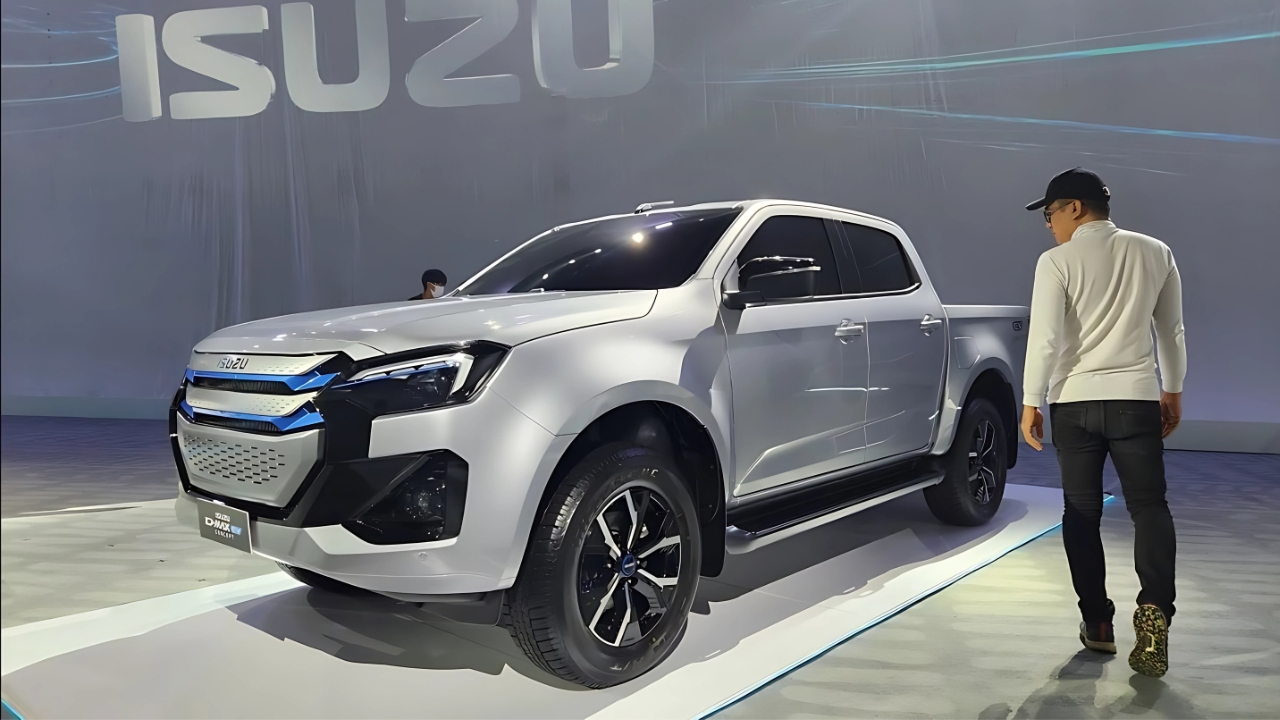Isuzu D-Max EV : The pickup truck world just got its most significant shake-up in years. Isuzu has officially launched the D-Max EV, and while the 263-kilometer driving range might seem modest by today’s electric vehicle standards, this truck represents something far more important than just another EV entering the market.
Why This Matters More Than You Think
The D-Max EV isn’t just Isuzu’s first electric pickup truck—it’s Europe’s first fully electric commercial pickup with genuine work credentials, including a full 1-tonne payload and 3.5-tonne towing capacity. This isn’t a lifestyle vehicle pretending to be a work truck; it’s a real commercial vehicle that happens to run on electricity.
Think about what this means for small business owners, contractors, and fleet managers who have been waiting for an electric option that doesn’t compromise on capability. Until now, most electric pickups have focused on impressive acceleration figures and flashy features rather than the bread-and-butter requirements of actual work.
The Reality Behind the Range Numbers
The 263-kilometer WLTP range figure comes from a 66.9kWh lithium-ion battery pack, and yes, that might sound limited compared to some passenger EVs. However, context is everything here. Most commercial vehicles don’t travel massive distances daily—they typically operate within defined territories, returning to base each evening where charging can occur.
Interestingly, the D-Max EV achieves 361 kilometers of range in city driving conditions, which makes sense given how regenerative braking works more effectively in stop-and-go traffic. For urban delivery services, construction sites, and municipal fleets, this could actually be more than adequate.
More Capable Than You’d Expect
The engineering behind this electric pickup demonstrates thoughtful design rather than hasty electrification. The dual-motor setup produces 140kW total power (roughly 190 horsepower) with 325Nm of torque, split between a 43kW front motor and a 97kW rear motor. This configuration enables full-time four-wheel drive without the complexity of traditional transfer cases.
What’s particularly impressive is how Isuzu maintained the D-Max’s renowned off-road capabilities. The electric version retains 210mm ground clearance, can wade through 600mm of water, and maintains approach and departure angles of 30.5° and 24.2° respectively. These specifications matter enormously for users who need to access remote job sites or navigate challenging terrain.
The towing and payload capacities remain unchanged from the diesel version, which addresses one of the biggest concerns about electric work vehicles—that electrification would compromise utility. Many potential buyers have worried that battery weight would eat into payload capacity, but Isuzu appears to have engineered around this challenge effectively.
The Pricing Reality Check
In the UK, pricing starts at £59,995 (excluding VAT) for the eDL40 Extended Cab, with the premium eV-Cross Double Cab at £62,495 (excluding VAT). When you add VAT and other costs, you’re looking at prices that approach the $100,000 mark mentioned in early reports, particularly for higher-specification models.
This pricing positions the D-Max EV as a premium offering, but it’s important to consider the total cost of ownership. Electric vehicles typically offer lower operating costs through reduced fuel and maintenance expenses. For businesses, there are often additional incentives, tax benefits, and grants available for electric commercial vehicles that can significantly offset the higher purchase price.
Charging Infrastructure and Real-World Use
The D-Max EV supports 50kW DC fast charging, enabling a 20-80% charge in one hour. While this isn’t the fastest charging available today, it’s adequate for most commercial applications, especially considering that most charging will occur overnight at depot locations.
For AC charging, the vehicle accepts up to 11kW, which provides a full charge in 10 hours—perfect for overnight charging at business premises. This charging profile suggests Isuzu understands how commercial vehicles are actually used in the real world.
What This Means for Different Users
For fleet managers, the D-Max EV represents a genuine alternative to diesel pickups without operational compromises. The predictable range and charging requirements make route planning straightforward, while the retained payload and towing capabilities mean existing workflows don’t need to change.
Small business owners, particularly those in urban areas, might find the D-Max EV attractive not just for environmental reasons but for practical ones too. Many cities are implementing low-emission zones and congestion charges that favor electric vehicles, potentially providing daily operational savings.
Construction and maintenance contractors who typically work within a defined geographic area could benefit significantly. The instant torque delivery of electric motors can actually improve performance in demanding applications, while the quieter operation opens up opportunities for work in noise-sensitive areas.
The Bigger Picture
The D-Max EV’s arrival follows successful electric pickups like the Ford F-150 Lightning and Tesla Cybertruck, but it takes a different approach by prioritizing commercial capability over consumer appeal. This focus on utility over flashiness might actually prove more significant in the long run.
The truck industry has been slower to electrify than passenger cars, partly because commercial buyers are typically more conservative and require proven reliability. Isuzu’s reputation for building durable, dependable vehicles could help accelerate acceptance of electric commercial vehicles.
Isuzu D-Max EV
Production has begun for European markets, with UK deliveries starting in February 2026. Right-hand-drive production is scheduled to begin at the end of 2025, with other global markets to follow based on demand.
The success of the D-Max EV could influence how other manufacturers approach commercial electrification. Rather than trying to create revolutionary designs, there’s clear value in electrifying proven platforms while maintaining their core strengths.
The 263-kilometer range might not grab headlines like some electric vehicles, but for the D-Max EV’s intended users, capability matters more than impressive numbers. This truck represents a practical step forward in commercial vehicle electrification—one that prioritizes real-world utility over marketing appeal.
For businesses ready to make the transition to electric, the D-Max EV offers a credible option that doesn’t require compromising on the fundamental requirements of a work truck. That might be exactly what the commercial vehicle market needs right now.
